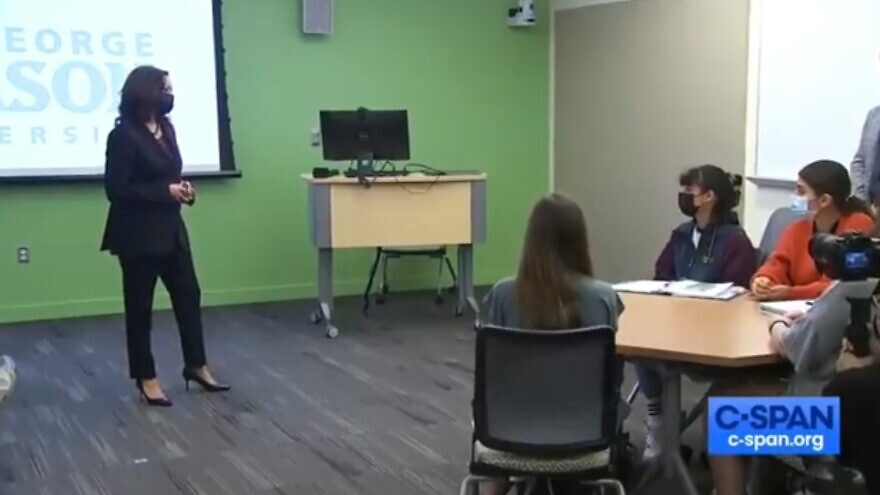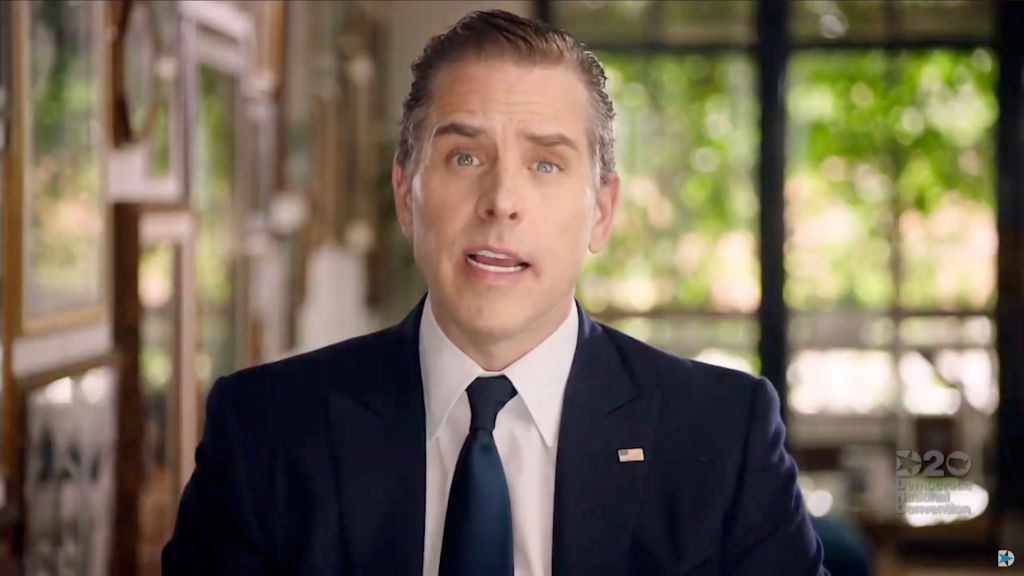 The
positive favorability rating of Israel among Americans is likely
related to views on the Israeli and Palestinian political systems. While
Israel is a thriving liberal democracy, the PA is a corrupt,
ineffective, and failed dictatorship. |
As the worldwide mass demonstrations during the latest war between
Israel and Hamas vividly illustrate, every conflict is fought twice:
first on the battlefield, then in public opinion. Having failed to
destroy the State of Israel upon its birth and in ensuing decades of
terrorism, the Palestinians waged a sustained propaganda battle to win
over Western hearts and minds, especially in the United States, the
foremost world power and Israel's staunchest and most longstanding ally.
Turning Israel's struggle for survival upside down—with aggressors
turned into hapless victims and vice versa—the fake Palestinian
narrative of unblemished victimhood has made inroads into American
public opinion. This has been especially true since the onset of the
Oslo "peace process," which transformed the Palestine Liberation
Organization (PLO) overnight from the world's leading terror
organization into a (supposed) peaceable political actor.
Yet, examination of American attitudes toward the Palestinian-Israeli
conflict over the past two decades, as reflected in national public
opinion surveys during this period, reveals stable and highly favorable
feelings toward Israel, albeit not without some widening fissures, and
unfavorable, if somewhat improving, attitudes toward the Palestinians.
Indeed, even the foremost indicator of the improving Palestinian
image—the growing support for the establishment of a Palestinian state
within the framework of the two-state solution—is not only a corollary
of pro-Palestinian sentiments but also of the widespread belief that, as
the only (perceived) road to peace, such a move is in Israel's best
interests.
Trends and Issues
Favorability. General feelings toward peoples and nations
influence opinions on specific issues and policies, and surveys use the
term "favorability" to gauge such feelings. Over the past two decades
most surveyed Americans held positive opinions of Israel, with its
favorability rate rising from 62 percent in 2000 to 74 percent in 2020
(an average 64 percent rate in 2000-10, and 71 percent in 2011-20). By
contrast, favorable opinions of the PLO-controlled Palestinian Authority
(PA), established in 1994 by the Oslo accords as the official governing
body of the West Bank and the Gaza Strip's Palestinians, remained
conspicuously low (and virtually unchanged) over the past two decades:
21 percent favorability rate in 2000 and 23 percent in 2020.
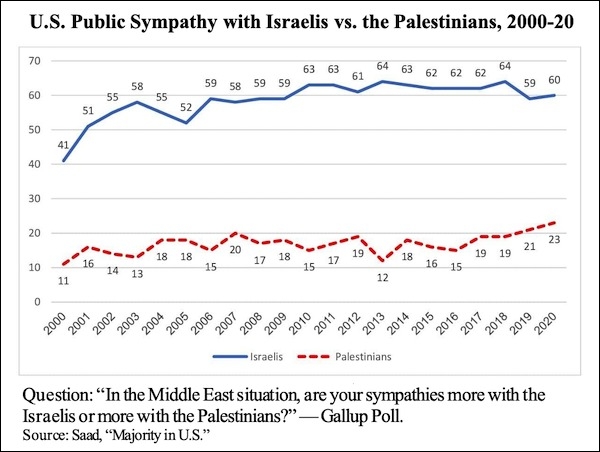
Apart from the numerous, mutually beneficial aspects of the
longstanding U.S.-Israeli relationship (e.g., military, intelligence,
and technological collaboration), this substantial favorability gap is
probably related to the diametrically opposed nature of the Israeli and
Palestinian political systems. While Israel is a thriving liberal
democracy, the PA is a corrupt, ineffective, and failed dictatorship.
During its 27-year existence, it has been headed by only two leaders:
Yasser Arafat until his death in November 2004, and Mahmoud Abbas ever
since (despite the expiry of his presidential term in early 2009).
Similarly, the PA held parliamentary elections only twice—in January
1996 and January 2006—after which it effectively ceased to function as
Abbas would not allow Hamas, which won the 2006 elections by a
landslide, to run the PA. This drove the Islamist terror organization to
eject the PLO violently from Gaza in 2007 and to establish its own
repressive rule there.
Nor has the PA ever established an independent media and judiciary or
respected basic human rights including freedoms of life, liberty,
opinion, expression, assembly, and women rights.[1]
And while the PA regularly blames its ineptness and failures on the
"Israeli occupation," the truth is that this "occupation" ended in
January 1996 when Israel withdrew its forces from the West Bank's
populated areas, with the exception of Hebron where redeployment was
completed in early 1997, while withdrawal from the Gaza Strip's
populated areas had been completed by May 1994. Since then, 95 percent
of the West Bank and the Gaza Palestinian population have lived under
the rule of the PA (and since 2007, under Hamas's rule in Gaza), which
have turned these territories into repressive dictatorships.[2]
Another cause of the negative view of the PA (and Hamas) has been its
persistent use of terrorism—from Arafat's tacit encouragement of
Hamas's and the Islamic Jihad's 1990s suicide bombings; to its
four-year-long terrorist war (September 2000- February 2005), euphemized
as the "al-Aqsa Intifada"; to the firing of thousands of rockets from
the Gaza Strip on Israeli population centers; to the "pay and slay"
policy of remunerating convicted terrorists imprisoned in Israel.
Indeed, whenever Palestinian terrorism seemed to be abating, there was a
spike in the PA's favorability image among Americans, notably in 2005
when the "al-Aqsa Intifada" withered away following Arafat's death and
Israel's successful counterterrorism measures.
There is a historic trend of greater American sympathy with Israelis than with the Palestinians.
|
Sympathies. As with the favorability factor addressing
attitudes toward Israel and the PA as political entities, the "sympathy"
factor, exploring sentiments toward Israelis and Palestinians as
national communities, has evinced a historic trend of greater American
sympathizing with Israelis than with the Palestinians (or other Arabs
for that matter). Examples include: the overwhelming U.S. public support
for the establishment of a Jewish state before the passing of the
November 1947 U.N. partition resolution when 65 percent of Americans
surveyed in a Gallup poll supported the idea[3]; the wall-to-wall sympathy for Israelis and censure of Arab aggression during the 1967 Six-Day War (56 percent vs. 4 percent),[4] and a figure of 64 percent in sympathy with Israelis during the 1991 Gulf War, compared to 7 percent with the Palestinians.[5]
There has, of course, been the occasional fluctuation from this
pattern in accordance with regional vicissitudes. After the September
1982 killing of hundreds of Palestinians in the Beirut refugee camps of
Sabra and Shatila by a local Christian militia, for example, the gap
between sympathy for Israelis and Palestinians narrowed to its slimmest
point (32 percent vs. 28 percent). Conversely, Palestinian support for
Saddam Hussein's brutal occupation of Kuwait and his unprovoked missile
attacks on Israel led to a record sympathy gap of 57 percent in favor of
Israelis. But on the whole, the "sympathy index" during the latter part
of the twentieth century reveals a substantial and stable gap in favor
of Israelis.
This pattern stayed virtually unchanged in 2000-20, with American
public opinion remaining vastly more sympathetic to Israelis than to
Palestinians. Thus, the sympathy gap between the two groups grew from 35
percent in 2001 to 48 percent in 2010 (51 percent vs. 16 percent and 63
percent vs. 15 percent respectively) before narrowing to 37 percent in
2020 (60 percent vs. 23 percent). This shows that the increase in
sympathy for the Palestinians did not come at the expense of sympathy
for Israelis, with the average gap in their favor over the past two
decades standing at 41 percent, being slightly wider in 2020 than in
2001: 37 percent vs. 35 percent.[6]
As in previous decades, there were some fluctuations from this
general pattern of stability, mainly in the extent of sympathy for the
Palestinians: the greater their political intransigence and physical
violence, the less public American sympathy there was for their cause
and the reverse. Thus, for example, the outbreak of the "al-Aqsa
intifada" widened the sympathy gap in favor of Israelis from 30 percent
in 2000 to 45 percent in 2003 with this gap narrowing to 38 percent in
2007 with the abating of this war of terror.
Paradoxically, the sympathy gap in Israelis' favor widened noticeably
during Barack Obama's two terms in office (from 41 percent in 2009 to
47 percent in 2016) and narrowed by the same ratio during Donald Trump's
presidency (from 43 percent to 37 percent). Obama took an unabashed,
anti-Israel stance. He told Abbas, "You will never have an
administration as committed [to the Palestinian cause] ... as this one."[7]
The Palestinians likely took this as a carte blanche for shedding all
pretenses of seeking a settlement and left the negotiating table with
Israel. Similarly, Hamas exploited Obama's anti-Israel stance by
transforming the Gaza Strip into an ineradicable terrorist bastion that
rained thousands of rockets and missiles on Israel's population centers,
triggering four ferocious wars (in 2008-9, 2012, 2014, and 2021). By
contrast, Trump's staunch support for Israel generated a timid
Palestinian policy for fear of retribution by the unpredictable U.S.
president as vividly illustrated by the relative calm along the
Gaza-Israel border, the low-key response to recognition of Jerusalem as
Israel's capital, or to the move of the U.S. embassy to the city. All
this occurred in stark contradiction of widespread apocalyptic
predictions that these moves would trigger a regional conflagration.
The Two-state Solution
Since Jordan's renunciation of its claim to the West Bank in July
1988, and the PLO's feigned acceptance four months later of Security
Council Resolution 242 that created the land-for-peace formula, the
resolution has been reinterpreted (or rather misinterpreted as it makes
no mention of the Palestinians) to imply a two-state solution. It has
been considered the cornerstone of a future Israeli-Palestinian peace,
based on an Israeli state and a newly-established Palestinian state in
the West Bank and the Gaza Strip living peacefully side by side.[8]
This misinterpretation gained further momentum with the 1993 launch
of the Oslo process, which was widely seen as geared toward that goal
though none of the agreements signed within this framework spelled it
out. And while the PLO remained highly evasive, supporting the two-state
solution while addressing foreign audiences and prophesying Israel's
demise to its own Palestinian constituents, all Israeli prime ministers
during the Oslo years (with the exception of Yitzhak Rabin who envisaged
"an entity short of a state")[9] publicly endorsed the two-state solution.
Against this backdrop, very few American public opinion polls during
the 1990s directly addressed the two-state solution, likely because it
was generally assumed to be the only possible option. The issue
resurfaced following the seeming collapse of the Oslo process after the
launch of Arafat's war of terror in September 2000. In subsequent years,
the American public's support or opposition to the idea fluctuated in
line with the vicissitudes in the ferocity of Palestinian terrorism and
the extent of their political intransigence.
Thus, for example, support for the two-state solution dropped from 53
percent in 1999 to 40 percent in 2000—its lowest point in the
subsequent twenty years—before leaping to 58 percent in 2003—the highest
level ever since.[10]
This was due to Israel's highly successful counterterrorism campaign
that broke the backbone of the Palestinian war of terror and enabled
President Bush to make his June 2002 historic speech espousing the
creation of a Palestinian state headed by "new leaders, leaders not
compromised by terror" and predicated on "entirely new political and
economic institutions based on democracy, market economics and action
against terrorism."[11]
And while this change of Palestinian leadership failed to materialize,
support for the two-state solution remained steady for the rest of the
Bush presidency, sliding gradually over the years to 52 percent in 2008
(with opposition rising from 22 percent in 2003 to 29 in 2008) as peace
hopes faded after Hamas's January 2006 landslide victory in the
Palestinian parliamentary elections and its violent takeover of the Gaza
Strip the following year.[12]
During Obama's two terms in office, support for the Palestinians and the two-state solution dropped.
|
Just as American public sympathy for the Palestinians dropped
noticeably during Obama's two terms in office, so did support for the
two-state solution, and for the very same reason: Public opinion polls
showed the strength of support for the creation of a Palestinian state
to be dependent on the PA's recognition of Israel's right to exist and
its determination to fight terrorism and dismantle the terrorist
infrastructure in the territories under its control.[13]
But with the most pro-Palestinian president in the White House since
Jimmy Carter, the PA hardened its intransigence in the hope that Obama
would deliver Israel on a silver platter, and American public support
for the two-state solution dropped.
Thus, when in June 2009, Benjamin Netanyahu agreed to the
establishment of a Palestinian state and five months later announced a
10-month construction freeze in the West Bank aimed at reviving
"meaningful negotiations to reach a historic peace agreement that would
finally end the conflict between Israel and the Palestinians," the PA's
chief peace negotiator Saeb Erekat warned that the prime minister "will
have to wait 1,000 years before he finds one Palestinian who will go
along with him." In addition, Fatah, the PLO's largest constituent
organization, reaffirmed its commitment to the "armed struggle" (the
standard euphemism for terrorism) as "a strategy, not tactic ... in the
battle for liberation and for the elimination of the Zionist presence."[14]
With this rejectionist mindset persisting through the Obama years,
accompanied as it was by rocket and missile barrages from Gaza on
Israeli towns and villages, American public support for Palestinian
statehood declined from 52 percent in 2008 to 44 percent in 2016 while
opposition to the idea grew from 28 percent to 37 percent.[15]
This trend seemed to persist during Donald Trump's first year when
the gap between support and opposition to the creation of a Palestinian
state reached its narrowest point (46 vs. 42 percent)[16]
due to the president's amenability to both the two-state and the
one-state solution. "I can live with either one," he told Netanyahu in a
White House meeting. "I'm very happy with the one that both parties
like."[17]
When the PA responded with a more restrained policy, American public support for a Palestinian state grew steadily.
|
Yet, this approach was quickly reversed as the PA responded to
Trump's staunch pro-Israel approach—manifested, among other things, in
his recognition of Jerusalem as Israel's capital and the move of the
U.S. embassy to the city—and adopted a more restrained policy in an
attempt to weather the storm until the arrival of a friendlier
administration. As a result of this lull, American public support for
the establishment of a Palestinian state grew steadily, surging after
the January 2020 release of Trump's long-awaited "Deal of the Century"
peace plan to its highest level since Bush's 2002 speech, with
opposition to the idea dropping to its lowest level (55 percent vs. 34).[18]
Political Attitudes
Republicans vs. Democrats. For decades, Israel enjoyed strong
bipartisan political support in Washington. Spread almost evenly among
Republicans and Democrats, this bipartisanship helped Israel promote
favorable legislation in Congress and secure high levels of military
aid. By the early 2000s, however, this pattern had fundamentally changed
with Republicans sympathizing more strongly with Israel than Democrats.
This partisan divide widened substantially over the next decades as
growing numbers of Republicans sympathized more with Israelis than with
the Palestinians (86 percent in 2020 compared to 59 percent in 2001)
while the level of sympathy for the Jewish state among Democrats
remained virtually unchanged (42 percent in 2001 compared to 44 percent
in 2020). Thus, while in 2020, nearly 9 of 10 Republicans sympathized
more strongly with Israelis than with Palestinians and only 5 percent
had greater sympathy for the Palestinians, Democrats sympathized almost
evenly with both sides: 44 percent vs. 38 percent.

The decline in sympathy for Israelis was the sharpest among liberal
and/or progressive Democrats: in 2014-16, the share of
liberals/progressives sympathizing with the Palestinians over the
Israelis shot from 21 percent to 40 percent. This downward shift in
sympathy for Israel was most pronounced during the Trump presidency as
the progressive wing of the party became increasingly powerful and
vociferous.[19]
Republicans and Democrats also differed on the establishment of a
Palestinian state with support for the idea consistently stronger among
Democrats. The gap between the parties was at its narrowest during the
Bush presidency, so much so that in 2003, under Bush, Republican support
for Palestinian statehood even surpassed that of the Democrats (60
percent vs. 55 percent). This was despite the fact that Democratic
support for the idea grew at a far higher rate during the Bush
presidency than during the Obama years (14 percent compared to 2
percent). The fact that Democrats' support for Palestinian statehood
remained virtually unchanged under a staunchly pro-Palestinian
Democratic president while significantly growing under a Republican
president inimical to the PLO and PA (especially after being lied to by
Arafat about his personal involvement in terror activities)[20]
was due to Israel's suppression of Arafat's war of terror (2000-05), on
the one hand, and the sustained rocket attacks on Israel's population
centers attending Hamas' Gaza takeover in 2007.
Indeed, even during the Trump presidency, support among Democrats for
the creation of a Palestinian state grew at a higher rate than under
Obama's watch: from 61 percent in 2017 to 70 percent in 2020 (while
Republican support for the idea grew by a whopping 19 percent: from 25
percent in 2017 to 44 percent in 2020). Thus, paradoxically, Trump's
"Deal of the Century" produced strong bipartisan support for Palestinian
statehood for diametrically opposed reasons: among Democrats, as a
means to subvert the deal, which they considered an obstacle to
Palestinian statehood, and among Republicans, as a means to promote the
two-state solution.
Religious Attitudes
American Jews. For obvious reasons, American Jews have always
felt attached to Israel, and this trend continued in 2000-20 with more
than two thirds of surveyed members of this community feeling affinity
and closeness to Israel, sympathizing much more with Israelis than with
Palestinians (93 percent in 2001-14, dropping to 86 percent in 2015-19).[21]
According to a 2019 survey, 80 percent of American Jews considered
themselves pro-Israel (despite being critical of government policies)
while 67 percent felt an emotional attachment to the Jewish state.[22]
As for the establishment of a Palestinian state, American Jewish
support remained rather static during the Bush and Obama's presidencies
(growing from 49 percent in 2002 to 52 percent in 2016), before gaining
considerable momentum during the Trump years: from 52 percent in 2016 to
64 percent in 2020. This corresponds to the pattern of Democratic
support for Palestinian statehood during the Trump years (hardly
surprising given the historic Jewish identification with the party),
with the notable exception that the rise in Jewish support for the idea
during this period was more dramatic than that of Democrats and the
general public (a 12 percent rise compared to 8 percent and 6 percent
respectively). This is most likely due to the addition of the
qualification "demilitarized" to the description of the Palestinian
state in the American Jewish Committee Poll, on the one hand, and to the
bipartisan nature of the Jewish community, on the other. As such,
support for Palestinian statehood was both an anti-Trump statement by
Democratic Party supporters (still the vast majority of American Jewry)
and a vote of confidence in Trump and his policies by the growing number
of American Jewish Republicans.
Christian Denominations. Religion has been a significant
predictor of attitudes toward the Palestinian-Israeli conflict with
devout Americans significantly more likely to sympathize with Israel
than their less devout counterparts and vice versa. Aggregate Gallup
data for 2000-19 shows that 66-71 percent of Americans who attended
church weekly or almost weekly sympathized with Israel compared to 46-49
percent of those who never attended religious services (and who were
twice more sympathetic to the Palestinians: 26 percent vs. 13 percent
respectively).[23]
The sympathy gap was at its lowest among those with no religious
affiliation, with 38 percent sympathizing with Israel and 29 with the
Palestinians.[24]
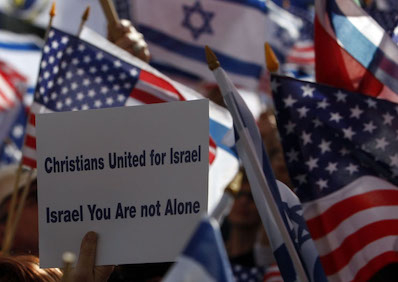 Devout
American Christians are more likely to sympathize with Israel than
their less devout counterparts are. Among Christians, Evangelical
Protestants' support for Israel has intensified most over the past two
decades. |
As such, religiously unaffiliated Americans were most critical of
Trump's Palestinian-Israeli policy with 47 percent thinking he favored
Israel too much and 38 percent saying he struck the right balance
between Israelis and Palestinians. By contrast, only 26 percent of
American Christians thought Trump was overindulging Israel while 59
percent (72 percent of Evangelical Protestants) believed he struck the
right balance. Interestingly, criticism of Trump's supposed indulgence
of Israel was significantly higher among American Jews than among their
Christian compatriots (43 percent vs. 26 percent), echoing the moderate
or conservative voice of the Democratic party, as opposed to its
liberal-progressive wing, which overwhelmingly believed Trump favored
Israel too much (66 percent).[25]
Broadly speaking, sympathy or favoritism of both Israelis and
Palestinians among American Christians grew substantially and rather
symmetrically over the past two decades: from 41 percent sympathetic to
Israelis vs. 13 percent sympathetic to Palestinians in 2003 to 69
percent vs. 41 percent in 2019: thus, a sustained 28 percent sympathy
gap in favor of Israel during this period.[26]
In terms of denominational affiliation, Mormons sympathized most
strongly with the Israelis (79 percent vs. 11 percent with the
Palestinians), followed by Protestants (66 percent vs. 13 percent) and
Catholics (50 percent vs. 18 percent).[27]
Yet it was evangelical Protestants, sometimes called "Christian
Zionists," whose staunch and consistent support for Israel has
intensified most impressively over the past two decades. In 2003, 55
percent of white Evangelicals sympathized with Israel and only 6 percent
with the Palestinians (compared to 41 percent vs. 13 percent of all
surveyed Christian religious groups)[28];
by 2016, this ratio had grown to 79 percent (5 percent sympathized with
the Palestinians). Support among evangelical Republicans was even
higher—85 percent, compared to 69 percent of all Republicans.[29]
Even as American public attitudes toward the conflict became
increasingly polarized during the Trump years, with Democrats more
favorable for the first time toward Palestinians and the PA (58 percent
vs. 57 percent) than toward Israelis and the Israeli government (27
percent vs. 26 percent),[30]
evangelical support remained undaunted. Some 79 percent of Evangelicals
had a favorable view of Israelis (compared to 35 percent of
Palestinians), and 61 percent viewed the Israeli government
positively—while only 13 percent had a positive view of the Palestinian
Authority, and 79 percent viewed the authority negatively.[31]
Conclusion
While surveys of American public opinion show steady and consistently
stronger sympathies for Israel and Israelis than for Palestinians and
the Palestinian Authority in 2000-20, these attitudes have grown
increasingly partisan over the past decade, culminating during the Trump
presidency in Democrats sympathizing more with the Palestinians and the
PA than with Israelis and the Israeli government. This shift was
primarily a corollary of the relatively low level of Palestinian
political and military militancy during the Trump years. Indeed, more
than any other single factor, it is the intensity of Palestinian
violence and intransigence that has determined the way Palestinians and
the PA were seen by Americans and the extent of support for the
establishment of a Palestinian state.
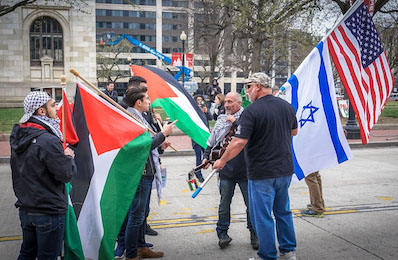 Supporters
of Israel and the Palestinians meet. The intensity of Palestinian
violence and intransigence has determined the extent of American support
for the establishment of a Palestinian state. (Photo: Ted Eytan) |
As a result, public sympathy with the Palestinians was less, even
among Democrats, during the Obama presidency than during the Bush and
Trump years as the PA and Hamas interpreted Obama's anti-Israel bias as
free rein to walk away from the negotiating table and to subject Israeli
civilians to years of sustained rocket and missile attacks. This
Palestinian pattern seems to be repeating itself with the Biden
administration's eagerness to reenter the Iran nuclear deal; its cold
shouldering of America's longstanding regional allies; and its
restoration of the Palestinian problem to the top of its agenda. These
policies have already enticed Hamas into a war with Israel and triggered
mass violence in the West Bank and by Israel's Arab citizens.
Though Palestinian violence and intransigence are almost certain to
intensify in tandem with the Biden administration's increased pressure
on Israel, this may not necessarily dampen public sympathy for the
Palestinians as in past decades since several key developments seem to
be working in their favor. For one thing, the fervent polarization of
American politics, alongside the mainstreaming of anti-Semitism and the
continued movement to the left of Democratic constituencies, may have
made segments of American society less sensitive to anti-Jewish and
anti-Israel violence. For another thing, with twice as many sympathizers
among non-white Americans (33 percent in a 2020 survey vs. 18 percent
of whites) as opposed to Israel's predominantly white sympathy base (68
percent in the same survey vs. 43 percent non-whites),[32]
the Palestinians have successfully cast their fight to destroy Israel
as a liberation struggle by a colonized indigenous people against a
"privileged white oppressor."
Small wonder that as Hamas was deliberately perpetuating the wanton
war crime of raining thousands of missiles on Israel's population
centers, the Black Lives Matters movement tweeted its "solidarity with
the Palestinians," adding a thinly veiled wish for Israel's demise: "We
are a movement committed to ending settler colonialism in all forms and
will continue to advocate for Palestinian liberation. (Always have. And
always will be)."[33]
Israel and its allies in
the United States must endeavor to restore the traditional, bipartisan
support of Republicans and Democrats.
|
In light of the above polls, if Israel and its allies in the United
States wish to maintain its still significant support vis-a-vis the
Palestinians in American public opinion (60 percent vs. 23 percent in
2020),[34]
they must address any liberal-progressive criticism, strengthen the
bond with the American Jewish community—especially its younger
segments—and endeavor to restore the traditional, bipartisan support of
Republicans and Democrats.
Eytan Gilboa is
Professor Emeritus of Political Science and International Communication
at Bar-Ilan University and a senior research associate at the BESA
Center for Strategic Studies. His publications include books and
numerous articles on American-Israeli relations including The American Public and Israel in the Twenty-First Century (BESA, 2020).
[1] Bassem Eid, "Confronting Human Rights Abuses in the Palestinian Authority: An Essential Step for Progress in the Region," The Henry Jackson Society, London, 2016.
[2] Efraim Karsh, "The Oslo Disaster," Begin-Sadat Center for Strategic Studies, Bar-Ilan University, Mideast Security and Policy Studies, no. 123, 2016, pp. 21-2.
[3] Efraim Karsh, The Tail Wags the Dog: International Politics and the Middle East (London: Bloomsbury, 2015), p. 56.
[4] Eytan Gilboa, American Public Opinion toward Israel and the Arab-Israeli Conflict (Lexington, Mass.: Lexington Books, 1987), pp. 47-8.
[5] "American Sympathy toward Israel and the Arabs/Palestinians, 1967-2020," Jewish Virtual Library, Chevy Chase.
[6]
"Republicans and Democrats Grow Even Further Apart in Views of Israel,
Palestinians," The Pew Research Center, Washington, D.C., Jan. 23, 2018.
[7]
Ben Birnbaum and Amir Tibon, "The Explosive, Inside Story of How John
Kerry Built an Israel-Palestine Peace Plan—and Watched It Crumble," The New Republic, July 20, 2014.
[8] "Resolution 242 (1967) of 22 November 1967," S/RES/242 (1967), U.N. Security Council, New York.
[9] The 376th session of the 13th Knesset, Oct. 5, 1995.
[10] Lydia Saad, "Americans Closely Split Over Palestinian Statehood," Gallup, Washington, D.C., Feb. 24, 2015.
[11] "President Bush Calls for New Palestinian Leadership," White House archives, Washington, D.C., June 24, 2002.
[12] Lydia Saad, "Americans Still Doubt Mideast Peace Is in the Cards," Gallup, Washington, D.C., Feb. 27, 2014.
[13] See, for example, "Israel and the Palestinians," PollingReport, Washington, D.C., Aug. 5, 2020.
[14] Karsh, The Tail Wags the Dog, pp. 170-1.
[15] Saad, "Americans Closely Split Over Palestinian Statehood," Feb. 24, 2015; Saad, "Americans Still Doubt Mideast Peace Is in the Cards," Feb. 27, 2014.
[16] Lydia Saad, "Majority in U.S. Again, Support Palestinian Statehood," Gallup, Washington, D.C., Apr. 22, 2020.
[17] Politico (Arlington, Va.), Feb. 15, 2017.
[18] Saad, "Majority in U.S. Again, Support Palestinian Statehood," Apr. 22, 2020.
[19]
Samantha Smith and Carrol Doherty, "Five facts on how Americans view
the Israeli-Palestinian conflict," Pew Research Center, Washington,
D.C., May 23, 2016; "Republicans and Democrats Grow Even Further Apart," Jan. 23, 2018; Lydia Saad, "Americans, but Not Liberal Democrats, Mostly Pro-Israeli," Gallup, Washington, D.C., Mar. 6, 2019.
[20] Douglas J. Feith and Lewis Libby, "How the Trump Plan Makes Peace Possible," Middle East Quarterly, Fall 2020.
[21] Frank Newport, "American Jews, Politics and Israel," Gallup, Washington, D.C., Aug 17, 2019.
[22] "American Jewry Position Survey," White Papers and Research, Ruderman Family Foundation, New York, Dec. 2019.
[23] Frank Newport, "Religion Plays Large Role in Americans' Support for Israelis," Gallup, Washington, D.C., Aug. 1, 2014; Newport, "Americans' Views of Israel Remain Tied to Religious Beliefs," Gallup, Mar. 19, 2019.
[24] Smith and Doherty, "Five facts," May 23, 2016.
[25]
Gregory Smith, "U.S. Jews Are More Likely than Christians to Say Trump
Favors the Israelis Too Much," Pew Research Center, Washington, D.C., May 6, 2019; "Half say Trump is 'striking about the right balance' in dealing with Israelis and Palestinians," Pew Research Center, Apr. 24, 2019.
[26] "American Evangelicals and Israel," Pew Research Center, Washington, D.C., Apr. 15, 2005;
"Evangelical Protestants, mainline Protestants and Catholics express
more favorable views of Israelis than Palestinians," Pew Research
Center, May 6, 2019.
[27] Smith and Doherty, "Five facts," May 23, 2016; Newport, "Religion Plays Large Role in Americans' Support for Israelis," Aug. 1, 2014.
[28] "American Evangelicals and Israel," Apr. 15, 2005.
[29] Smith and Doherty, "Five facts," May 23, 2016.
[30]
"U.S. Public Has Favorable View of Israel's People, but Is Less
Positive Toward Its Government," Pew Research Center, Washington, D.C., Apr. 24, 2019.
[31] Smith, "U.S. Jews Are More Likely Than Christians to Say Trump Favors the Israelis Too Much," May 6, 2019.
[32] "Gallup News Service Gallup Poll Social Series: World Affairs—Final topline," Feb. 3-16, 2020.
[33] Twitter, Black Lives Matter, May 17, 2021.
[34] Saad, "Majority in U.S. Again, Support Palestinian Statehood," Apr. 22, 2020.
